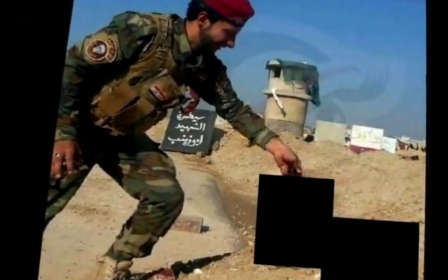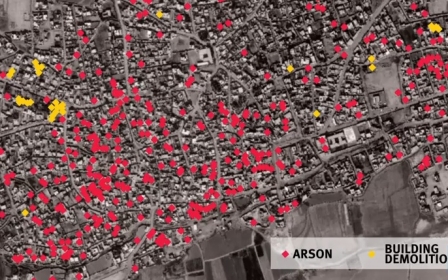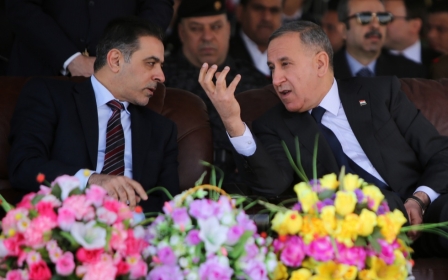US says Iraq has not asked for airstrikes in Tikrit

Iraq has not made a formal request to the US-led coalition fighting the Islamic State (IS) group to provide air support in the country's offensive to retake Tikrit, a Pentagon spokesman said on Thursday.
He spoke after one of the top Iraqi commanders for the offensive on Sunday called for the international coalition to provide air support to help swing the battle for the city.
The offensive to push back IS from Tikrit began on 2 March, and Iraqi forces have only recently reached the city limits where they have been stalled by bombs and entrenched fighters.
Pentagon spokesman Colonel Steven Warren said he wasn't aware that any airstrike requests had come through.
"I am not aware of any request that we've received through official channels to participate in operations around Tikrit," he said.
While some reports indicate that numerous Iraqi forces had entered the city, Warren said the government offensive remained mostly on the outskirts.
"They certainly have Tikrit surrounded. I'm sure there are areas and spots where they are inside the city limits but for the most part they are in the outskirts of Tikrit," he said.
Warren described the battle lines around Tikrit as "static".
The operation to take Tikrit, 100 miles (160 kilometers) north of Baghdad, was launched by thousands of soldiers, police, Shiite militias and Sunni tribes.
The city is the capital of the Salaheddin province and the hometown of late-strongman Saddam Hussein.
It was seized by IS in June of 2014 as the group took control of large swathes of Iraq and Syria.
Leading up to Wednesday, the international coalition against IS had launched 2,893 airstrikes, 1,631 in Iraq and 1,262 in Syria.
The US led 2,320 of the strikes, or about 80 percent.
Between Wednesday and Thursday the coalition conducted approximately 19 more strikes.
Sectarian split
This month, US Joint Chiefs of Staff General Martin Dempsey flew to Baghdad and found himself confronted by a problem that vexed him in the past - the country's volatile sectarian split.
Dempsey noted that his conversations were all too familiar. "This was like deja vu for me," he said.
After flying over the capital by helicopter, he noted the Shiite banners flying over buildings, referring to "the plethora of flags, only one of which happens to be the Iraqi flag".
More than 10 years ago, Dempsey led the 1st Armored Division in Baghdad, just as Sunni-Shiite violence exploded.
Later, he was put in charge of training the Iraqi army. But the Shiite-led government's exclusion of Sunnis was a recurring frustration.
Today, he is urging a new government led by a new prime minister, Haider al-Abadi, to make good on its promises to bridge the sectarian divide.
"I got a lot of assurances," Dempsey said. "But I made it clear that chief among our campaign assumptions is the establishment of a national unity government."
Meanwhile, Peter Chiarelli, a retired army four-star general who served in Iraq at the same time as Dempsey, remembers the shocking bloodshed when Iraq's sectarian split erupted and his exasperation with the Shiite government led by the then prime minister, Nuri al-Maliki, who failed to reconcile the Sunni community.
In 2006, Chiarelli told decision makers that sending more US troops would merely amount to a "band aid" if Sunni-Shiite tensions were not addressed.
Nearly a decade later, Chiarelli holds a similar view about the current mission.
"We can't repeat the mistakes that we made over the last eight years," he said.
And Dempsey strikes a similar theme - suggesting the war effort will be doomed if the Baghdad government fails to make good on its vow to reach out to Sunnis.
The IS group has exploited the alienation of the Sunni population. And the Iranian-backed Shiite militia's treatment of Sunnis already has raised alarms.
Dempsey repeatedly warned during his trip that the aftermath of the battle for Tikrit would present a high-stakes test for whether the Iraqi government could restrain Shiite fighters and deliver on its promises to Sunnis.
"We have learned from the past 10 years," he wrote, "that it is not enough to simply alter the balance of military power without careful consideration of what is necessary in order to preserve a functioning state."
New MEE newsletter: Jerusalem Dispatch
Sign up to get the latest insights and analysis on Israel-Palestine, alongside Turkey Unpacked and other MEE newsletters
Middle East Eye delivers independent and unrivalled coverage and analysis of the Middle East, North Africa and beyond. To learn more about republishing this content and the associated fees, please fill out this form. More about MEE can be found here.




